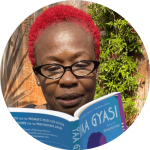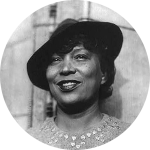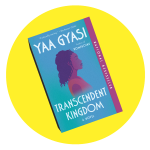Dilemmas of Identity
Hello Deep Readers,
Welcome to week two of our four-week exploration of Yaa Gyasi’s novel, Transcendent Kingdom. By now you should be reading the novel—giving you plenty of time to finish by Yaa Gyasi’s visit on May 15.
Last week, we discussed ways of reading deeply and the many tensions at work in the novel. The responses you shared on our website have been great. Christine Cordero Merriman writes, “I love that the familial relationships are messy, real, and complicated. They highlight the tensions between cruelty and need, protection and harshness, and love and anger–all interwoven with tenderness and set in the context of two different cultures and a culture within a culture.” Thank you to Christine and all the community commentators so far. We hope you keep the conversation going this week.

Reading Identities
This week we are featuring Gina Athena Ulysse, a Haitian-born artist-anthropologist and Professor of Feminist Studies at UC Santa Cruz. We were excited to talk with her and get her perspective on the novel.
The Deep Read: You’re an artist and scholar. You’re also an immigrant from Haiti. Do you see analogues between your experiences and Gifty’s life story in Transcendent Kingdom?

Gina Athena Ulysse: I was fascinated about what it would mean for Gifty to individuate as a young Black woman from an immigrant family, trying to choose to be her own person in the context of the shadows of her lineages. She’s caught between worlds–Ghana and the U.S., the working class and middle class, religion and science. These ever-present dualities dominate so many aspects of her life and are the core of this novel. These tensions are further complicated by the fact that she is not African-American.
While there are some similarities in my experience as an immigrant from the Caribbean, there are too many divergences to note here. As a professor who has been teaching for over two decades, though, I have seen aspects of Gifty’s dilemma in young students from the Caribbean or the African continent who struggle to navigate the implications of what it means to be an immigrant and Black in a country where Blackness is under siege. Too often, Black immigrants are pitted against African-Americans as model minorities—that is until they’ve been politicized and recognize that Blackness is a political category. The fact remains that, in the public imaginary, they are just Black, whatever that means. Yet, we also know this could lead to fatal consequences. That said, the book exposes both the promise and the failure of the American dream. In that regard, Nana’s story is as relevant to me and takes center stage in terms of his heartbreak, deferred dreams, and how he became a statistic.
The Deep Read: What parts of Transcendent Kingdom resonated with you?
Gina Athena Ulysse: One of the moments that caught my attention is when Gifty is talking to her colleague, Katherine, about gender discrimination in STEM. Katherine asks her to join the Women in STEM group that she leads and Gifty says, “no.” Without even “a second thought,” as she says, she rejects being in this group. And then Gifty says, “I want to be thought of as a scientist, full-stop, and it mystified me that Katherine, whose work was published in the best journals, was content to draw attention to the fact of her womanhood” (85). It made me pause, as I was struck by this expression of a desire to just “be” raceless and genderless in a world that is and has historically been gendered and racialized. From a Black feminist standpoint, as someone who sees power everywhere, I could not relate. At first, I found this passage to be naïve and simple, which of course, made me recall the generational appeal of color-blindness.
Minoritized folks have always had to be, as Gyasi writes, “nothing but blazing brilliance” (63), to prove they are worthy. This is nothing new. It’s an old story that continues to define experiences of Blackness here and everywhere. That’s just one of the facts of Blackness, or the price of the ticket, to paraphrase classic works of the Martinican philosopher Frantz Fanon and African American writer James Baldwin.

Seeking deeper layers of understanding, my meditations on this section lead to more connections. In Zora Neale Hurston’s (right) essay, “How it Feels to be Colored Me” (1928), she wrote the famous line “I feel most colored when I am thrown against a sharp white background.” It is in the midst of whites that Hurston—who grew up in the first incorporated all-Black town in Florida—recognized perceptions of herself as Black. The refusal of a consistent identification with Blackness (for both Gifty and Hurston) is such a solitary pursuit.
Perhaps this moment offers the reader a slight window into Gifty’s identity struggle. Is this a yearning to “just” be? To individuate? Is individuation possible in a racist and racialized context? What would that look like? What does it mean to be exceptional, an individual, which sometimes is at odds with a collective identity? Still, we confront the model-minority again. I thought of Manoucheka Celeste’s media studies book, Race, Gender and Citizenship in the Black Diaspora, in this moment in the novel. It’s an analysis of Black international migration stories in the news and popular culture. More specifically, the book explores the different ways diverse Black immigrants negotiate their Blackness as social, economic, and political subjects in the U.S. context. I could also see Gifty talking back, per bell hooks, finding her voice, and individuating within the family structure.
The Deep Read: What are some aspects of the novel that connect to your work and reading?
Gina Athena Ulysse: I always work on more than one project at a time. This allows me to both maintain balance and respond to the muses. I am currently working on an experimental feminist ethnography book On What Not to Tell about the ways silence functions as a form of capital we use and exchange at various moments in our lives. I found resonances with the novel, especially with the treatment of mental health. The silences. The stigma.
The art project I am most focused on these days is inspired by the forest and issues of wholeness and well-being (I am obsessed with the redwoods). Regardless of form, my approach to my practice is based on a concept I refer to as “rasanblaj,” which comes from a Haitian Creole word that translates to reassembly, regrouping. Rasanblaj is the gathering of ideas, things, and people’s spirits—not necessarily in that order.
Thinking of the novel as a rasanblaj of sorts has kept me reading as I grapple with some of its dualities and incessant trauma, especially since I am also currently reading Carl Jung’s The Red Book. In these pandemic times, I appreciate a deep dive into the unconscious to confront my inner selves and mull over broader existential questions.

Go Deep
Prof. Ulysse raises many interesting questions about Gifty’s identity struggle in the novel and how racism in the U.S. informs this struggle, particularly how U.S. racism tends to flatten out the experiences of Black people and immigrants in this country and pit Black immigrants against African Americans. Gyasi wrote about this in a 2016 NY Times piece. In addition to the “Women in STEM group” passage referenced above, where else do you see Gifty directly, or even indirectly, referencing racism and her struggle to “individuate … as a young Black woman from an immigrant family,” as Prof. Ulysse so eloquently puts it? How are you understanding Gifty’s identity conflict—is it an either/or struggle between Ghana and America, a clash with the desire for colorblindness in a “color-coded” world, or something else?

Taking up the concept of “rasanblaj,” this collection of ideas, people, and spirits that Prof. Ulysse speaks about, where do you see this playing out in the novel, and what are the effects of reading the novel through this lens? What might it help us see and understand more deeply about Transcendent Kingdom? How might it help us grapple with the tensions that Prof. Ulysse mentions and that we highlighted in last week’s digest?
Join the community conversation: We encourage you to think through these questions as you read and share your thoughts in the comments below 👇
Community Conversation
Share your thoughts, reactions, and ideas with the Deep Read Community. Please note, comments are moderated and won’t populate immediately. Send any questions to deepread@ucsc.edu.
